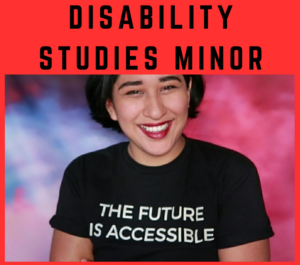
Minor in Disability Studies

CSUN instituted the first minor in Disability Studies in the CSU, and we have one of only a few programs in Disability Studies nationwide.
Emerging out of the civil rights and disability rights movement, Disability Studies examines the social, cultural, historical, and political structures that inform disability. From a humanities perspective, of course, this means that we are interested in the lived experience of individuals with disabilities, often studying disability as a social construct rather than simply as a confining medical diagnosis.
Furthermore, because disability is an identity which one may acquire at any point in life, whether at birth or later by disease, accident, or advanced age, it is the largest minority in the world, an identity which intersects with any other identity marker, such as race, gender, sexuality, or class. This is what makes Disability Studies so very necessary.
We need to prepare graduates who are excited to build a more inclusive world. This means that we teach students not only to examine the cultural meanings associated with disability (e.g. how did we arrive at the presumption of various values attached to one type of embodiment or mind over another?) but to address those problematic assumptions as well as the very real needs for equity in the community and workplace—whether it’s through inclusive classrooms, assistive technology, urban planning, public policy, or functional fashion. What’s at stake is the right to inclusion in all aspects of life, which is a fundamental human right.
The minor is 18 units, made up of three core classes and three electives, drawn from over 20 departments in the University. Most of the courses that students select from also count for GE credit, so the minor in Disability Studies is incredibly easy for students to build.